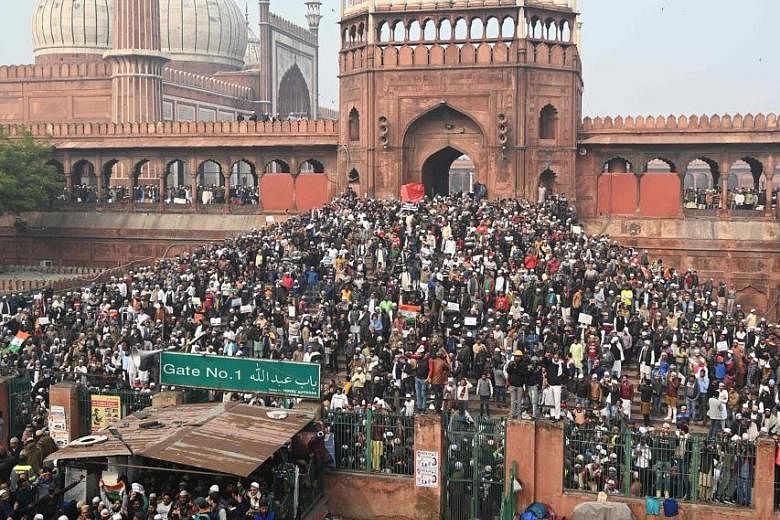India's capital city New Delhi along with other parts of the country continued to see protests yesterday, some of which turned violent, amid anger over a new citizenship law.
Late yesterday, police sprayed protesters with water cannon to keep them from marching towards a monument in Central Delhi. Reports said at least 35 people were injured in the protests.
Protests earlier in the day in the capital were peaceful, with hundreds of people gathering at the 16th-century Jama Masjid mosque.
In an unusual scene in the mosque just after Friday prayers, Bhim Army leader Chandrashekhar Azad, who had given a call for a protest march, read the Preamble to the Constitution.
The move has become a popular form of protest as people believe the citizenship law runs contrary to the country's secular Constitution.
The Bhim Army represents the rights of the downtrodden Dalit caste.
A proposed march from the mosque to an area near India's Parliament was banned by the police, and a large number of officers were waiting outside the mosque.
In the central state of Uttar Pradesh, protests turned violent after police and protesters clashed, and there were reports of stone pelting in at least three cities, including Gorakhpur, the constituency of the state's chief minister Yogi Adityanath who is from the pro-Hindu Bharatiya Janata Party (BJP).
Indian media reported five deaths across Uttar Pradesh.
-
NET SHUTDOWN
-
101
Number of times Internet was shut down in India this year.
134
Number of times in 2018.
79
Number of times in 2017.
Protesters set fire to police vehicles in the city of Bulandshahr and the state's police said more than 300 people have been arrested since Thursday, when one person was killed.
Opposition members have pointed out that most of the violent protests are being reported in states ruled by the BJP, led by Prime Minister Narendra Modi, who won re-election in May.
But just seven months into his second term, he is facing a massive challenge amid protests over the new Citizenship Amendment Act (CAA), which gives citizenship to illegal immigrants from Afghanistan, Bangladesh and Pakistan who are of the Hindu, Sikh, Buddhist, Jain, Parsi and Christian faiths, but not Muslims.
The protests, which have left 11 people dead and led to the detention of more than 4,000, first erupted in India's north-eastern parts, where many do not want the naturalisation of illegal immigrants of any religion.
The unrest spread to other parts of the country, with protesters saying the legislation is divisive and aimed at marginalising Muslims.
One means that the authorities have used to curb protests is through Internet shutdowns.
The Internet was turned off in parts of Uttar Pradesh and Karnataka even as it was restored in the north-eastern state of Assam on court orders.
In Assam, the first message 22-year-old student Bhavana Barman posted on social media was a call to protest against the citizenship law.
"I wrote, 'Say no to CAA' across all my social media accounts. This Internet ban won't dampen our protest. We will keep fighting," said Ms Barman.
The state's government had blocked the Internet on Dec 11 to curb protests over the CAA.
Pointing out that the legislation is discriminatory, she added: "Even during the nine-day ban, we haven't been sitting idle.
"We visited houses and (college) hostels to let people know when and where our next protest will be held. We communicated through phone calls and SMS."
The anti-CAA protests that started last week have hastened the pace of Internet shutdown in the country, which has done it 101 times this year, according to the Internet Shutdown Tracker.
The longest is in Kashmir, which has gone on for 136 days, and counting. Last year, it was shut down 134 times and in 2017, 79 times.
But while the Net has come back on in Assam, it remains blocked in parts of the central state of Uttar Pradesh and southern state of Karnataka as the authorities try desperately to rein in the protests.
Meanwhile, the government has sought to assure Indians that the CAA would not strip Indian Muslims of citizenship, nor would an impending National Citizens Register (NRC), which it said was meant to weed out illegal immigrants.
The register was implemented in Assam where 1.9 million people were left out of it for the smallest infractions, such as a misspelt name in an identification document.
Fears have grown in the Muslim community that they would have no recourse if struck off the register. The government has tried to assuage these concerns.
Environment Minister Prakash Javadekar said yesterday: "Whenever NRC will come, it will be so smooth that nobody will be deprived of their citizenship."
But protesters are not convinced.
"The whole NRC thing is arbitrary and the CAA is discriminatory," said Mr Chandan Sharma, a 19-year-old student from Assam who is living in Delhi.
He said his father has been left out of the NRC in Assam while he and his mother made it to the list, fuelling his decision to join the protests.
"It's not good," he added.

